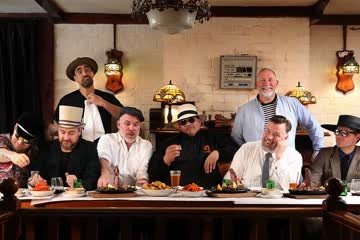'We Need To Start Doing Things Differently, Urgently': The Biggest Challenges Facing Regional And Remote Music In 2025
It goes without saying that regional and remote communities face difficulties when it comes to music, but what are the biggest challenges these areas are facing? And how do we solve them?

Angus Field, Raechel Whitchurch, and Jack Parsons (Credit: Supplied)
There’s no denying that the music world is doing it tough. From the constant news of events and festivals being cancelled, to the ever-present stress of the rising cost of living, it seems harder than ever for music fans to get out amongst it and revel in the joy made possible thanks to their favourite artists.
Then, of course, there’s the challenges faced by the artists themselves. Alongside low payments from the streaming platforms, a competitive industry, and other rising threats such as AI, it almost feels like there are more roadblocks than ever when it comes to creativity.
However, all of those elements are compounded when we head outside the capital cities and look at regional and remote areas. That’s where the Regional & Remote Music Summit comes in. Making its return in 2025 at the Byron Community Centre in Byron Bay, the program features a dynamic lineup of keynotes, panels, and workshops that highlight the power of music to shape place, identity, and connection across Australia. You can find out more about this year’s Summit here.
Noted for not exactly being a hive of musical activity, with fewer venues, fewer opportunities, and fewer resources on offer, both artists and fans often find themselves struggling when it comes to their passions, often relying on regional tours and other rare options in order to embrace the world of music.
But just how bad is it? What are the struggles faced by those out in regional and remote Australia?
To answer this question, we spoke to a number of figures with experience on the matter. From the likes of 3%’s Angus Field, Green Music’s Tim Shiel, and Jack Parsons of the Pretty Littles and Guts Touring and the Bush Touring Fund, to Dark Mofo's Kimberley Galceran, Tamworth Country Music Festival's Roz Pappalardo, Sure Thing Agency's Raechel Whitchurch, and Dashville's Matt Johnston, we’ve gathered insights from those with strong opinions and vested interests in the topic to discover what the issues are and what can be done.
Don't miss a beat with our FREE daily newsletter
Angus Field – 3%
What is the biggest challenge facing regional and remote music in 2025?
The biggest challenge facing regional and remote music today is the level of opportunity and exposure regional artists have. Regional musicians have nowhere near the amount of opportunity as the cities because of the lack of exposure and culture that small regional areas bring. Regional areas are filled with middle class, working people who are generally unaware of what talent and exciting new artists are in their community because of the generational exposure of the top hits around the world.
This is due to radio stations that have the most money thrown at them by big companies, generally in the city to advertise in smaller areas, and in my home town, for example, the music is completely chosen by a station in the city like Nova. If we’re trying to build grassroots music in regional areas there's no hope to build opportunity when young aspiring artists get overshadowed by superstars in different countries who get full rotation on local radio stations that most people in the area are listening to on an everyday basis.
In my opinion, there is just as much talent in regional areas as cities but so many young artists do not pursue music because of the lack of chances to shine in their craft, and also the dismal financial reward that comes with playing music in regional areas. For example, for the usual cover set which isn’t even original music, the artist will get around $300 – $350 for three hours. This has been the general rate since I was 14 years old and I am now 28.
The price of beer when I was 18 was around $6. It is extremely hard to find a schooner for any less than $10 these days, so obviously the pubs and bars are making more money than they were but still paying the musicians the same price. And don’t get me started on their earnings from the poker machines. This is an issue.
Also, when a young artist decides to follow their passion and make it a career, they have no idea where to turn or who to contact because regional areas are so poor with their original music demand. This often leads to the artists giving up because they have no idea where to go or how to take the next step.
Myself, I had to move away to an area more rich with music to break the shackles of my regional home town to get a start in my career. In sports such as rugby league and soccer, it is an easy, drawn-out path on how to reach the next stage, and that has been the understanding for young regional kids for years.
Let me tell you, there are just as many amazing musicians in regional areas as there are sports people but musicians are always told ‘it’s up to you,’ ‘take every opportunity,’ and ‘just keep going’. But where exactly do you go? Once you play every venue in your home town to the same crowd for years and no breakthrough it’s hard for artists to keep turning up everyday and laying their soul on the line when there is minimal reward.
What is a possible solution for this challenge?
I feel like opportunities presented by the government and funded by the government could improve all of these scenarios that I just listed. Starting with the opportunities that regional areas lack. Music festivals used to be a heartbeat of the northern rivers and mid north coast, giving young artists something to aspire to do, but as said by the CEO of Splendour In The Grass, the price of living has decimated the festival industry and the collapse of the world-renowned Australian festival scene has left the opportunities and aspirations of young artists even worse than they ever were.
I feel as though, just like the NRL and country rugby league have scouts and grassroots officers, there should be roles put in place funded through government sources to have scouts and grassroots officers to be assigned to different regions to be constantly working with young artists, and be an industry link to gain access to the industry that the city artists have into the Australian music scene.
These officers should be people with work experience and a high level name of musicians in the Australian music scene that will guide young artists towards the correct industry people to help get them seen outside of the rural and regional areas that they are from. The arts have always lacked funding and now is a more appropriate time then ever to start injecting money into grassroots music especially in regional areas because of the rise of social media musicians and the loss of festivals.
Also I feel as though there could be government incentives to start funding local radio stations to support them in choosing musicians from their area and fund events in each community to allow an opportunity for original music to be shined upon and then have industry professionals at the events to scout the amazing talent that our regional artists have.
As I said before, it’s a cultural challenge as for generations the popular radio stations are playing the best hits from around the world and constantly feeding the ears of the general public with superstars that don’t need any more publicity. Radio stations need to be funded to stand on their own two feet and not controlled by a big sister station in the city that’s choosing their music for them.
And lastly is the amount of funding young regional musicians get for their craft. $350 for a three-hour set is shameful to be paying musicians who are turning up and usually playing to empty rooms because people in regional areas haven’t heard of them and only listen to big artists like Taylor Swift and Ed Sheeran.
There should be a law to make this price much higher, either give the musician a percentage of what the pub makes that night in alcohol and the pokies or bring in a new base rate that is much higher than the original. Also they should have a greater price for original music to entice original musos to practise their craft more and make it more accessible in the community.
We are at a crisis point for regional music and personally I’m afraid that the incentive to create music and make it a career in regional areas will get lost if something isn’t changed. I feel as though there needs to be a steep injection of government funding and ideas on this topic before we lose this amazing thing that we call ‘local Australian music’ to the other countries around the world.
Tim Shiel – Green Music
What is the biggest challenge facing regional and remote music in 2025?
I really do believe that music is suffering from a bit of an identity crisis, that artists and listeners alike are challenged by a lack of imagination caused by decades of being exploited and underserved by tech platforms and corporations alike. It can really feel like we've lost sight of what music's role in our lives can be beyond "music as a product."
So as much as I think regional music communities face unique challenges, at the end of the day, I think the biggest challenge is the one that faces us all, which is how do we remove consent from the "usual way of doing things" and start imagining alternatives.
This is particularly resonant when you look at it through the lens of the ongoing climate crisis, and the urgent and rapid shift in mindset and behaviours required to deal with that. We need to start doing things differently, urgently.
What is a possible solution for this challenge?
I actually think regional and remote music communities have a unique opportunity to lead, because the idea of community is not so foreign in regional centres as it is the cities, plus music is often operating more outside of the context of bigger national or global industry infrastructures. That provides space for imagination and experimentation.
Maybe this is idealistic thinking and I'm just a city guy who wishes he was a country guy. But it does sometimes feel that in the inner city we lose connection with our neighbours, with our local area, and are perhaps more vulnerable to internalising unhealthy incentives that lead to toxic behaviour around music -–i.e. the social media grind, becoming obsessed with the numbers, trying to "break into" an imagined industry or scene.
We need to run the other way from that, plug back into each other as humans and creative people, and from those connections build the community and solidarity that can truly drive change via experimentation and imagination.
Jack Parsons – Guts Touring / Bush Music Fund
What is the biggest challenge facing regional and remote music in 2025?
There are different considerations for regional and remote touring. Some challenges overlap, some are distinct. I think regional touring needs to have more input from fans, so bands can mitigate potential losses. They can make sure at least some tickets will be sold by involving fans when deciding where to go. This has already been adopted by some bands.
We found this challenging when Guts was more of a regional tour – there was a massive inconsistency in sales and this made forecasting treacherous. Our version of remote touring is putting on free shows with possibly one or two ticketed shows, if we visit bigger towns along the way. It's not really a business model and we rely on funding and partnerships to make it possible.
But it's by far and away the most rewarding style of tour I've ever been a part of. It's about giving people an experience they rarely get and creating a platform for local acts.
What is a possible solution for this challenge?
A way to get around those regional inconsistencies is to pinpoint the towns which show up when something comes through. Guts struggled to cut through in bigger regional towns where footy, front bars, and covers are king. But smaller towns like Marlo, Point Lonsdale, and Port Pirie kicked off. If something was happening, it wouldn't get lost in the wash.
I'd also encourage bands, agents and promoters to shift expectations a bit. Not to worry about the perfect PA or backstage area or making sure their rider is perfectly executed. Charge a bit more for a ticket, plug in and play. You'll be better for it. You'll inspire someone.
Kimberly Galceran – Dark Mofo
What is the biggest challenge facing regional and remote music in 2025?
Being remote has proven to be an asset to Dark Mofo, but speaking from a year-round venue operator perspective (Odeon and Altar Bar), the main challenge is audience density versus box office outcomes that appeal financially to touring promoters.
Luckily we're seeing Hobart become a wishlist destination for artists as well as an increase in show attendance, so things are on the up. Remote locations, intimate formats, road-tripping tours and untapped scenes are novel experiences for touring artists and massively appreciated by regional communities, hopefully we see more of this trend.
What is a possible solution for this challenge?
On the flip side – and something I'm passionate about – is Tasmania's amazing independent music scene. Because of its isolation the bands here have difficulty making an impact nationally to catapult their careers.
This is despite having some of the best skills and stage presence, and sharpest songs I've experienced with DIY bands. The solution? Easier access to funding, stronger representation and support on a national scale. And people like me saying, “Check out the ****ing talent down here, would ya?”
Ros Pappalardo – Tamworth Country Music Festival
What is the biggest challenge facing regional and remote music in 2025?
For me it’s the lack of skilled technical staff in regional and remote venues – attracting staff and retaining staff is proving to be almost an impossibility.
Then there is a lack of state and federal money to maintain and improve many regional and remote facilities which doesn’t help in attracting industry talent, touring artists and works, and turns off audiences. Not to mention safety becomes a big cost.
What is a possible solution for this challenge?
Money for developed and up to date (safe) infrastructure, proper funding for on-the-job mentorship of incoming technicians. Artists who understand that touring to regional and remote locations might not have the technical support that they would have in metro and adjust their show/s accordingly, and champions on the ground in regional and remote areas across the whole sector from marketing to programming to technical to operations.
Raechel Whitchurch – Sure Thing Agency
What is the biggest challenge facing regional and remote music in 2025?
In my opinion, the biggest challenge right now is a lack of dedicated music spaces, coupled with limited industry knowledge and support.
Post-2020, many venues are still struggling regionally and this has seen a decline in investment into music. Previously venues may have taken a risk on a new act and even provided marketing support, but now they’re hesitant to do anything that isn’t a sure bet.
What has made this harder is that the regional scene is quite different to the metro scene (and even the regional centres) and many industry experts have limited knowledge on practical ways for artists to connect with audiences in these more remote locations. Those who do are hesitant to share their knowledge or don’t have the platform to do so.
What is a possible solution for this challenge?
One solution is for artists and their managers to work more closely with venue managers on marketing shows. Coming to the table with a dedicated checklist of all of the ways you plan to market the show (and following through on those things!) and also asking the venue for their local knowledge can really make a big difference to the success of a show.
Find one local champion of your music and brainstorm with them ways that you can connect in the local community. Grassroots always works better in regional areas when you’re trying to break new ground.
Some sort of mentorship program from MusicNSW or similar bodies, that involves music venues and artists could be helpful, but I do think that there has been a huge increase from many music bodies in the last few years. I’d be interested to know how many artists, managers and agents are actually implementing the knowledge they are learning.
Matt Johnston – Dashville
What is the biggest challenge facing regional and remote music in 2025?
The biggest challenge in regional music is there’s a proliferation of humans in regional areas that seem to just want to stay at home and pat the goat.
And I guess, we are at risk of international promoters prioritising profit over community development, who don’t feed the grass roots enough or give it space to develop.
What is a possible solution for this challenge?
The only solution I have is to keep chipping away and earn people’s interest.







